[Event Report] HGPI and the Japan Pharmaceutical Manufacturers Association’s Aging Group Joint Symposium “Health Challenges that Accompany Population Aging – Dementia and Cancer.” (September 8, 2023)
date : 10/31/2023
Tags: Dementia, NCDs, Precision Cancer Medicine
![[Event Report] HGPI and the Japan Pharmaceutical Manufacturers Association’s Aging Group Joint Symposium “Health Challenges that Accompany Population Aging – Dementia and Cancer.” (September 8, 2023)](https://hgpi.org/en/wp-content/uploads/sites/2/dementia-20230908-1-7.jpg)
Considering what is needed for Japan to mature as a society that supports health and longevity, a symposium was held on the themes of dementia and cancer, which are considered to be common among the elderly. Through keynote speeches and panel discussions, the event aimed to provide an opportunity to raise awareness and prepare for extending healthy life expectancy in Japan.
● Date and Time: September 8 (Fri.), 2023 at 10:30-12:00
● Venue: Nihonbashi Life Science Hub, Conference Room A
● Organizer: Japan Pharmaceutical Manufacturers Association (JPMA)
● Supported by: Health and Global Policy Institute (HGPI)
Opening
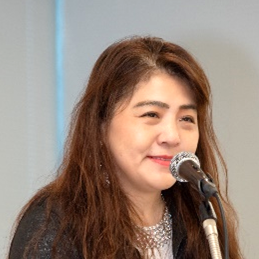 Dr. Sachiko Nakagawa (Managing Director, JPMA)
Dr. Sachiko Nakagawa (Managing Director, JPMA)
Japan, the country with the highest life expectancy in the world, is also known for its long healthy life expectancy. On the other hand, threat to the lives due to the increase in non-communicable diseases in ageing societies is becoming a common global challenge. It should be our mission in Japan to proactively address the issue of extending healthy life expectancy and to disseminate our efforts to the world. Today’s symposium, theme is “How can we extend healthy life expectancy?” We will consider it through keynote speeches and panel discussions by leading experts on dementia and cancer. I sincerely hope that this symposium will provide opportunities for early awareness and enough preparation to live longer as healthy as possible for ageing.
Keynote 1. “Towards Realization of Disease-Modifying Therapies for Alzheimer’s Disease”
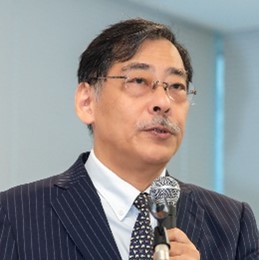 Prof. Takeshi Iwatsubo (Professor of neuropathology, The University of Tokyo Graduate School of Medicine/Director, National Institute of Neuroscience, National Center of Neurology and Psychiatry)
Prof. Takeshi Iwatsubo (Professor of neuropathology, The University of Tokyo Graduate School of Medicine/Director, National Institute of Neuroscience, National Center of Neurology and Psychiatry)
Dementia research has made great progress in recent years. For Alzheimer’s disease, a main form of dementia, the U.S. Food and Drug Administration (FDA) has approved an antibody drug (lecanemab) tailored to the pathogenic mechanism of the disease. Alzheimer’s disease manifests as dementia due to accumulation of amyloid beta protein in the brain, resulting in the loss of nerve cells over time. Lecanemab is intended for patients with mild symptoms and binds to remove aggregated amyloid beta. In clinical trials, it reduced clinical decline by 27%. On the other hand, adverse events, such as mild edema of the brain, have been observed in some cases. In addition, various clinical sites are conducting preventive early-stage clinical trials before the onset of symptoms to enhance the slowing of dementia progression. Toward the realization of an inclusive society as well as research and development, we will promote efforts to incorporate patients’ viewpoints in research and support participation of citizens.
Keynote 2. “Challenges of Addressing Health Care and Cancer Control in an Ageing Population”
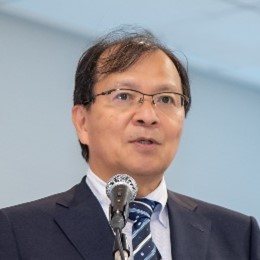 Dr. Hitoshi Nakagama (President, National Cancer Center Japan)
Dr. Hitoshi Nakagama (President, National Cancer Center Japan)
The number of elderly people with cancer is increasing in Japan, and so is the number of people who die from cancer. With the percentage of people over 65 years of age projected to reach 35% by 2040, cancer care will continue to face significant challenges in the future. The Basic Plan to Promote Cancer Control Programs (Phase 4), which came into effect in April this year, noted the importance of cancer care for the elderly. Cancers in the elderly tend to be detected at a relatively advanced stage and a large number of cases suffer from various complications. There is also a large variation in life expectancy among individuals. An increasing number of elderly patients choose not to be treated extensively cancers when there is a risk of disability remaining and insufficient scientific evidence on elderly patients, and therefore we should realize the importance of vigorous discussions and comprehensive decision in providing care. We also need to consider the growing disadvantages of conducting cancer screening in elderly populations. The recommendations on multiple disease prevention were published in 2021 (https://www.ncc.go.jp/jp/icc/cohort/040/010/6NC_20210820.pdf). In addition to cancer prevention, various personalized measures should be implemented that take into account individuals health conditions.
Panel Discussion: Thinking about Society-Wide “Preparedness” against Dementia and Cancer
Panelists:
Prof. Takeshi Iwatsubo, Dr. Hitoshi Nakagama, Ms. Matsuyo Kamada (Representative Director, Alzheimer’s Association Japan), Dr. Rin Ogiya (Senior Officer for Cancer Control, Cancer and Disease Control Division, Health Service Bureau, Ministry of Health, Labour and Welfare)
Moderator:
Mr. Shunichiro Kurita (Senior Manager, HGPI)
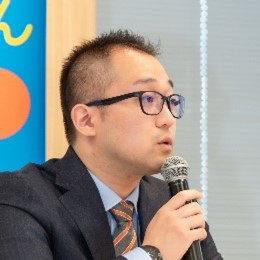 Kurita: Dementia and cancer are familiar symptoms/diseases that can affect anyone. Health in old age is recognized as a major issue not only for individuals, but also for society as a whole. How should we approach this issue from the different perspectives of civil society, hospitals and health care, and policy?
Kurita: Dementia and cancer are familiar symptoms/diseases that can affect anyone. Health in old age is recognized as a major issue not only for individuals, but also for society as a whole. How should we approach this issue from the different perspectives of civil society, hospitals and health care, and policy?
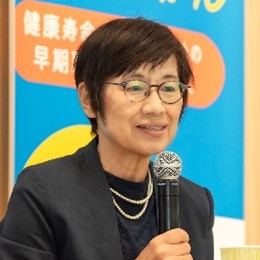 Kamada: The Framework for Promoting Dementia Care states “inclusion” and “prevention” as a basic policy. This requires us to have better knowledge about dementia, and people living with dementia to have a network with supporters and peers.
Kamada: The Framework for Promoting Dementia Care states “inclusion” and “prevention” as a basic policy. This requires us to have better knowledge about dementia, and people living with dementia to have a network with supporters and peers.
Ogiya: Patients are likely to be worried about their lives and treatment decisions after they are diagnosed with cancer. To relieve this anxiety, it is of foremost importance that they can access to correct information and consult with someone. The government provides information services and support at cancer center hospitals. I hope patients will actively use these services.
Iwatsubo: Society and the health care community need to be prepared for new dementia therapeutics that are emerging. The number of opportunities to treat elderly patients living with both cancer and dementia is also increasing, reminding us of the need to provide treatment in accordance with their needs.
Nakagama: Cancer survival and cure rates have improved greatly. While technology advancement has been made in health care, I think that in addition to treatment, there is a need to promote efforts rooted in our community life, such as survivorship and psychological care, and to improve health literacy.
Kurita: My understanding about dispelling anxieties and misunderstanding about diseases, promoting early treatment, as well as coexisting with patients in community life is that it is essential for civil society, scientists, and the government to collaborate in disseminating information.
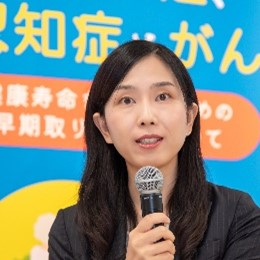
Ogiya: We in the government have implemented measures in a wide variety of fields to prepare local communities live with cancer, including support for patients to work and study, improvement in the quality of life of patients and their families, and research on treatment of the elderly.
Kamada: I think it is important to include people living with dementia in the discussion about policies and in the research and development of drugs.
Kurita: Thank you very much.

Top Research & Recommendations Posts
- [Policy Recommendations] Achieving a Sustainable Society of Health and Longevity Through the Integration of Environment and Healthcare-Incorporating a Planetary Health Perspective into the 3rd Phase of The Healthcare Policy-(December 20, 2024)
- [Research Report] Building a Mental Health Program for Children and Measuring its Effectiveness (June 16, 2022)
- [Policy Recommendations] Integrating Climate and Health for a Sustainable Society: Incorporating a Planetary Health Perspective into Nationally Determined Contributions (NDCs)(December 9, 2024)
- [Policy Recommendations] Developing a National Health and Climate Strategy for Japan (June 26, 2024)
- [Policy Recommendations] Policy Recommendations on Strengthening CKD Strategies for Workers: The Importance of Providing Early Detection, Intervention, and Support Through Screenings and Medical Visits (October 28, 2024)
- [Research Report] The 2023 Public Opinion Survey on Satisfaction in Healthcare in Japan and Healthcare Applications of Generative AI (January 11, 2024)
- [Event Report] Planetary Health Expert Meeting Aiming for Sustainable Healthcare: Learning from the Impact of Environmental Pollution and Medical Waste During the Pandemic (February 16, 2024)
- [Policy Recommendations] Obesity Control Promotion Project 2023 “The Next Steps for Engaging and Cooperating with Patients, Citizens, and Communities for Implements of Obesity Control Measurements” (April 8, 2024)
- [Announcement] A Turning Point Towards Building Green Healthcare Systems (June 5, 2024)
- [Research Report] Survey of Japanese Physicians Regarding Climate Change and Health (December 3, 2023)
Featured Posts
-
2024-11-25
[Registration Open] (Webinar) The 130th HGPI Seminar “Marking a Decade of the Act on Medical Care for Patients With Intractable Diseases: Connecting Intractable Diseases and Society From the Perspective of a Media Professional and Family Member” (January 28, 2025)
![[Registration Open] (Webinar) The 130th HGPI Seminar “Marking a Decade of the Act on Medical Care for Patients With Intractable Diseases: Connecting Intractable Diseases and Society From the Perspective of a Media Professional and Family Member” (January 28, 2025)](https://hgpi.org/en/wp-content/uploads/sites/2/hs130-top_JPNENG-1.png)
-
2024-12-18
[Policy Recommendations] Policy Recommendations on Strengthening CKD Strategies for Workers: The Importance of Providing Early Detection, Intervention, and Support Through Screenings and Medical Visits (October 28, 2024)
![[Policy Recommendations] Policy Recommendations on Strengthening CKD Strategies for Workers: The Importance of Providing Early Detection, Intervention, and Support Through Screenings and Medical Visits (October 28, 2024)](https://hgpi.org/en/wp-content/uploads/sites/2/HGPI_20241023_FY2024CKD_eyecatch.jpg)
-
2024-12-20
[Policy Recommendations] Achieving a Sustainable Society of Health and Longevity Through the Integration of Environment and Healthcare-Incorporating a Planetary Health Perspective into the 3rd Phase of The Healthcare Policy-(December 20, 2024)
![[Policy Recommendations] Achieving a Sustainable Society of Health and Longevity Through the Integration of Environment and Healthcare-Incorporating a Planetary Health Perspective into the 3rd Phase of The Healthcare Policy-(December 20, 2024)](https://hgpi.org/en/wp-content/uploads/sites/2/e8a714648913193b03d5b6ede38c161e.png)
-
2024-12-25
[Registration Open] (Hybrid Format) Expert Meeting “Innovations Required to Achieve Precision Psychiatry” (January 22, 2025)
![[Registration Open] (Hybrid Format) Expert Meeting “Innovations Required to Achieve Precision Psychiatry” (January 22, 2025)](https://hgpi.org/en/wp-content/uploads/sites/2/mh-20250122-topr-1.png)
-
2024-12-27
[Activity Report] Second UN General Assembly High-Level Meeting on AMR (September 26, 2024)
![[Activity Report] Second UN General Assembly High-Level Meeting on AMR (September 26, 2024)](https://hgpi.org/en/wp-content/uploads/sites/2/4ED86AF7-49DE-465D-B59D-843B4F3C6102_1_201_a-scaled-1.jpeg)




